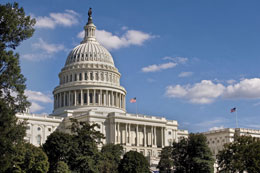RACING THIS WEEK
- News
- Horse Racing
- Racing Preview
- AQHA Racing Challenge
- Breeding
- Sales
- Quick Stakes Results
- Detail Race Results
- Qualifiers
- Leader Board
- Leading Sires
- Videos
- Auction Leaders
- Q-Racing
Streaming Video
FEATURES
SERVICES
Horse industry priorities included in FY2020 spending bill.

700 Page 2020 Spending Bill Includes Equine Sector Provisions
WASHINGTON, DCJANUARY 14, 2020While controversy surrounding impeachment proceedings dominated headlines at the end of 2019, federal lawmakers managed to pass a $1.4-trillion spending package to finance government operations through September 30, 2020.
Fortunately for the equine sector, the appropriations law includes provisions consistent with industry advocacy, ranging from support for Equine Assisted Therapy (EAT) programs to a continued ban on enforcement of the Electronic Logging Device (ELD) mandate on the transportation of livestock.
Provided by a press release distributed by the American Horse Council, below is a summary of highlights from the 700-page spending law that benefit the sector, reflecting policy outcomes that support many industry priorities:
- Department of Veterans Affairs (DVA) Congress recommends that agency officials devote $1.5 million for EAT, a funding level consistent with the FY2019 budget.
- DVA, Adaptive Sports Program The new law devotes substantial new resources to the Adaptive Sports Program an umbrella program covering EAT with a $16 million appropriation. This is an increase from $9 million for FY2019 and could potentially expand the pool of resources from which EAT facilities could draw.
- Department of Homeland Security (DHS), H-2B Guest Worker Visas The new law authorizes DHS to effectively double the number of H-2B guest worker visas issued in FY2020, which federal law currently caps at 66,000.
- Department of Transportation (DOT), Electronic Logging Device (ELD) The new law continues the ban on funding enforcement of the ELD mandate for livestock carriers.
- DOT/ Recreation and Trails Program Congress authorizes a study to quantify how much money non-highway recreation contributes to the Highway Trust Fund. The study will leverage efforts to dedicate more funds to maintain recreational trails.
- U.S. Department of Agriculture (USDA), Veterinary Medicine Loan Repayment The bill allocates $8 million to support veterinary student debt relief.
- Extension of Certain Expiring Tax Provisions Consistent with ongoing industry advocacy, the new law applies three-year depreciation for racehorses two years old or younger placed in service before 2021. This credit expired at the end of 2017 and applies retroactively through 2020.
- Unrelated Business Income Tax (UBIT) The new law repeals the UBIT a tax applied to non-profit groups and associations for certain employee fringe benefits. Known as the church tax, this was an unpopular provision included in the Tax Cuts and Jobs Act of 2017.
- DVA, Whole Health Initiative (WHI) Lawmakers have allocated $63.6 million to WHI, an umbrella program that supports a variety of therapies that promote mental health for veterans. Congressional allies are moving legislation that clarifies eligibility of
- EAT in a study measuring the impacts of various therapies on veteran mental health.
Other items that impact segments of the horse industry include the following:
- U.S. Department of Agriculture (USDA), Horse Protection Act (HPA) The law supports HPA implementation with $1 million for FY2020, an increase from $705,000 in FY 2019;
- USDA The law continues the longtime ban on the inspection and slaughter of horses under the Federal Meat Protection Act;U.S. Department of Interior, Bureau of Land Management (BLM) Lawmakers have dedicated $101.6 million to the Wild Horse and Burro program, an increase of $20 million from FY2019;
- USDA/ HPA The new law establishes public availability of a database that chronicles HPA enforcement records.

 Newsletters
Newsletters Facebook
Facebook